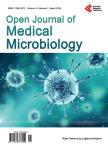Investigation of the Potential Association between Clustered Regularly Interspersed Short Palindromic Repeats (CRISPR) and Antibiotic Resistance Pattern of Bacterial Strains Isolated from Medical Waste and Environmental Water
Investigation of the Potential Association between Clustered Regularly Interspersed Short Palindromic Repeats (CRISPR) and Antibiotic Resistance Pattern of Bacterial Strains Isolated from Medical Waste and Environmental Water作者机构:Department of Biochemistry and Molecular BiologyUniversity of DhakaDhakaBangladesh
出 版 物:《Open Journal of Medical Microbiology》 (医学微生物学(英文))
年 卷 期:2018年第8卷第2期
页 面:13-25页
学科分类:1002[医学-临床医学] 100214[医学-肿瘤学] 10[医学]
主 题:Enterobacteriaceae Antibiotic Resistance Proteus Mirabilis Citrobacter freundii CRISPR-Cas
摘 要:Enterobacteriaceae are important human pathogens that cause many food and waterborne illness. Rapid emergence of multi-drug resistant bacteria in Bangladesh has become a serious problem. Phage-host interaction is now considered as the major driving force for the conversion of non-pathogenic bacteria to pathogenic ones. Evolution of highly pathogenic and antibiotic resistant bacteria largely depends upon the horizontal gene transfer by means of plasmid, megaplasmid and bacteriophages. Conversely, bacteria may acquire a novel defence mechanism called CRISPR (Clustered regularly interspersed short palindromic repeats) that can restrict horizontal transfer of plasmids and bacteriophages to limit the spread of antibiotic resistance genes among bacterial species. In this study, twenty bacterial strains were isolated from water of different medical waste and Buriganga river. Therefore, CRISPR locus was investigated following various biochemical and molecular analysis of those bacterial isolates. Identification of the bacterial isolates was conducted by Polymerase Chain Reaction (PCR) based assay of 16S rDNA extracted from those isolated strains. Results indicated that most strains were identified as Proteus mirabilis and Citrobacter freundii which mainly cause septicemia, and pneumonia in human. Thereafter, antibiogram of these strains was performed by using 11 different antibiotic discs where bacterial isolates from medical drainage system showed more resistant to antibiotics than the river water. In this study, CRISPR locus was also investigated within the genome of the isolated bacterial stains but unexpectedly, we did not find any CRISPR locus in their genome. In conclusion, we confirm that multi-drug resistant bacterial strains are devoid of CRISPR locus suggesting a possible negative association between CRISPR locus and antibiotic resistance. Further studies to pinpoint are required to elucidate the underlying mechanism of the association between CRISPR and antibioti



